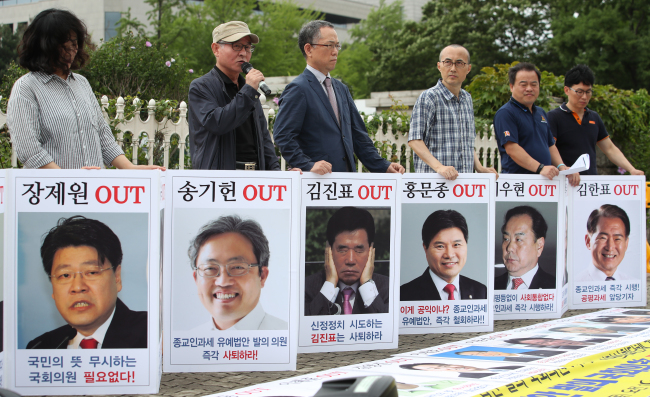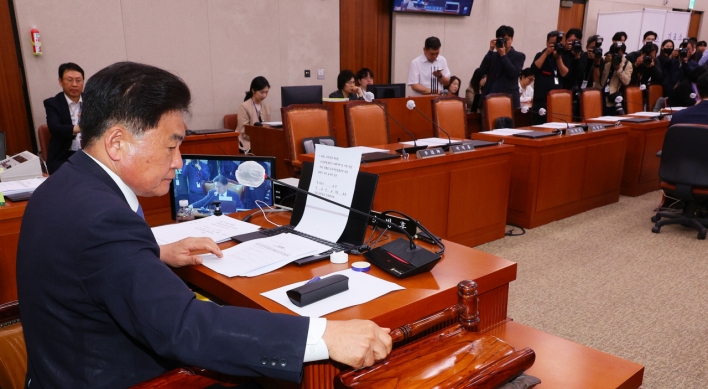Religious tax brawl disrupts Moon’s fiscal blueprint
By Bae Hyun-jungPublished : Aug. 24, 2017 - 16:29
President Moon Jae-in’s vision of improving economic equity may suffer some setbacks due to a group of Christian lawmakers’ resistance to an incoming taxation bill on religious leaders.
While the administration and the parliamentary cluster remained at odds over the issue, a public poll showed a majority of the public consider religious taxation necessary.
Civic groups, led by the Korea Taxpayers’ Association, on Thursday held a press conference in front of the National Assembly, demanding the resignation of lawmakers who motioned the postponement of the tax bill.
“Except for some conservative Protestant groups, a majority of the public opinion and of the civic society is demanding that the religious tax takes effect as planned,” they said through a joint statement.
“Those who have colluded with religious groups and thus failed to represent the people no longer deserve to be in the legislature.”
While the administration and the parliamentary cluster remained at odds over the issue, a public poll showed a majority of the public consider religious taxation necessary.
Civic groups, led by the Korea Taxpayers’ Association, on Thursday held a press conference in front of the National Assembly, demanding the resignation of lawmakers who motioned the postponement of the tax bill.
“Except for some conservative Protestant groups, a majority of the public opinion and of the civic society is demanding that the religious tax takes effect as planned,” they said through a joint statement.
“Those who have colluded with religious groups and thus failed to represent the people no longer deserve to be in the legislature.”

The participants -- mostly affiliated with Buddhist or Catholic clusters -- held up 25 placards, one for each of the 25 lawmakers who signed the bill, especially Rep. Kim Jin-pyo of the ruling liberal Democratic Party of Korea, who was the key motioner.
Their gathering came as backlash against Rep. Kim’s recent moves to revise the Income Tax Law so as to delay the implementation of religious taxes by another two years.
According to the renewed bill, taxation on clergy will be given another two years’ grace period and take effect in January 2020, instead of January next year.
Since 1968, religious tax talks have been ongoing, as the clergy has been excluded from income taxes, creating disputes over taxation equality.
A related bill was finally approved in 2015 to effectuate religious taxes, starting from January 2018, but Kim’s claim was the National Tax Service needs more time to revise its related regulations.
The lawmaker‘s action largely contradicted that of President Moon who, in order to carry out his welfare programs, repeatedly vowed to increase tax revenues and promote taxation justice.
“I shall make sure it takes effect next year as scheduled,” said National Tax Service Commissioner Han Seung-hee during a parliamentary confirmation hearing in June.
The Ministry of Strategy and Finance, too, confirmed recently that no change has been made to the government’s timeline.
“The fact that a related bill was submitted to the parliament does not bring changes to the government’s stance (on taxing the clergy),” Vice Finance Minister Ko Hyoung-kwon told reporters earlier this week.
A dilemma for the Moon administration, however, is that Rep. Kim was the chief of the State Affairs Planning Advisory Committee, the headquarters in charge of establishing the president’s key state affairs directions.
So far, the ruling party has refrained from officially commenting on the issue.
Meanwhile, a survey by local pollster Realmeter showed that 78.1 percent of respondents supported the current plan to start religious taxation next year. Of the 505 respondents, 14.2 percent stood against the idea, with 9 percent opposing the taxation altogether and 5.2 percent agreeing with the postponement.
By Bae Hyun-jung (tellme@heraldcorp.com)










![[Kim Seong-kon] Democracy and the future of South Korea](http://res.heraldm.com/phpwas/restmb_idxmake.php?idx=644&simg=/content/image/2024/04/16/20240416050802_0.jpg&u=)







![[Today’s K-pop] Zico drops snippet of collaboration with Jennie](http://res.heraldm.com/phpwas/restmb_idxmake.php?idx=642&simg=/content/image/2024/04/18/20240418050702_0.jpg&u=)